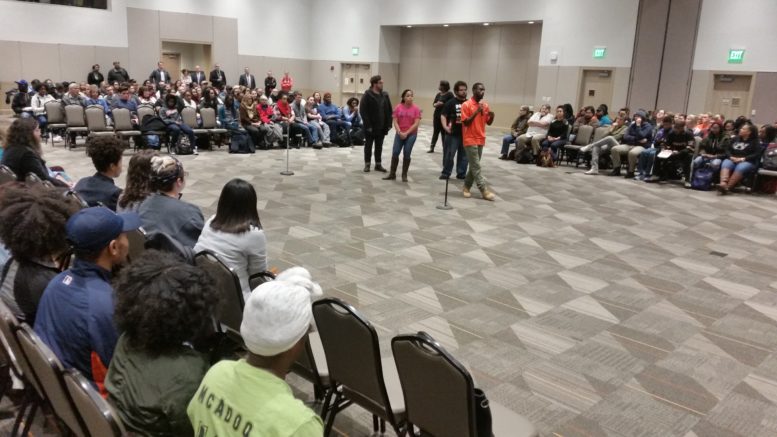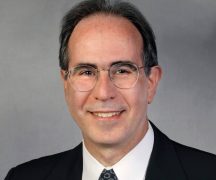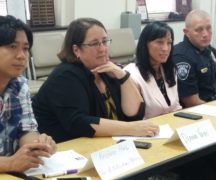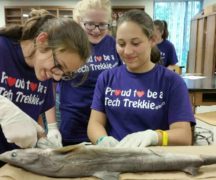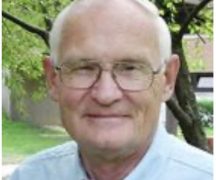By JAN LARSON McLAUGHLIN
BG Independent News
The election season has unleashed a deep hatred that is causing many Bowling Green State University students to feel uncomfortable on campus and in the community.
“I feel like I have to walk around with my head on a swivel,” said one African American student at a Town Hall held on campus Monday evening. “I shouldn’t feel like this. I paid to go here. I feel unsafe on this campus.”
Students shaken by the results of last week’s election met to create a safe place to talk. They heard story after story of fear, anger and uncertainty of the future.
Amira Hassnauoui, head of the Graduate Student Senate, could not hold back the tears as she talked about her decision to come to America from Tunisia.
“This is not the America I signed up for when I left my homeland,” she said. “This is my new home. I am here, but I am not a citizen and that scares me.”
Some of the anger was prompted by an attack reported by an African American student last week. On Facebook, the student reported she was attacked by a group of white males on Crim Street next to campus. Though students and faculty get emergency alerts for other incidents, many said they received no notice from the university and heard about the reported attack several days later.
The students and faculty present demanded to know why they had not been informed through the normal alert system. Tom Gibson, vice president for student affairs and vice provost, explained that university officials found out about the incident through social media – it was not initially reported to campus or city police.
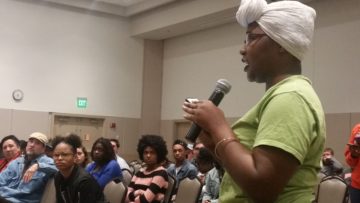
Naje Crawford speaks during town hall
Once university officials became aware, they contacted the victim and worked with her to report the incident to city police, he said.
“We take these issues very, very seriously,” Gibson said. “I take these issues very, very seriously.”
The university then sent an email communication out to students within 24 to 48 hours after the incident, he said. “It wasn’t as though we were reluctant.”
The incident is being investigated, according to Bowling Green Police Chief Tony Hetrick.
An instructor at the town hall meeting lashed out at Gibson, saying secrecy is not acceptable. “I am angry,” she said. “How am I supposed to recruit students” if the campus is not safe.
“Bowling Green needs to do better,” she said.
Gibson agreed that the university can do a better job of communicating issues like this.
Students also asked the university to take a stronger stand on verbal assaults on campus. One student living in Kohl hall said a Latino student was told she would be deported, and an African American student was called a racial slur. Those type of attacks should not be tolerated, she said.
“I’ve got to be laying on the ground for you to pay attention to me,” she said, adding that students should feel safe in their living space. “There’s not enough healing. There’s not enough hope.”
“It takes us to stand up and say, ‘We don’t do this at BGSU,’” another student said.
Several students reported a change on campus since the election.
“Now it feels a lot more menacing,” one said.
“The atmosphere feels so eerie, intimidating, scary,” a male African American student said. “I don’t like being scared.”
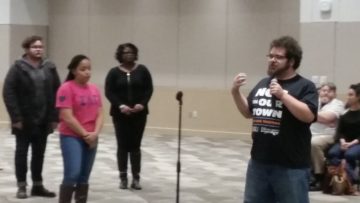
Organizers set the stage for town hall
Some in the audience saw the nation revert to earlier hatred that they believed was in the past.
“We thought we got beyond this,” said Kay Chapman, a lesbian.
Another person said the election season allowed racism to “come out of the shadows.”
“As a country, it just seems like we went backwards,” he said. “We time-traveled backwards.” And once again, the nation will be in the hands of “all 60-year-old white men.”
A female student told of being the only black employee at a local hair salon. She now feels frightened. “I’ve never understood why my blackness offends anybody.”
Another student commented on all the “Make America Great” hats and shirts seen on campus. “I lot of people get bold when they feel they have the power to do things,” he said.
Another said she was unsure how to “move on,” since she was finding it hard to understand how people sitting next to her in classes could vote for Donald Trump. “I don’t like to walk around campus with people who think so little of me.”
Many of those attending the town hall came to BGSU in hopes of changing their lives and their corners of the world. Kandann Coleman, leader of the Latino Student Union, grew up in Toledo and told of the KKK marching past her house when she was 7 years old. “I don’t run from things,” she said.
The president of the Black Student Union, Jauntez Bates from Detroit, said he lost eight people in his life this summer to violence. “It’s very hard being a black man in America,” he said.
Naje Crawford, who came to BGSU from Washington, D.C., realizes when people in Bowling Green look at her they see her dark skin – not the fact that she is a 4.0 GPA student. The election finally made some Americans wake up to the hatred. “Let your skin crawl,” Crawford said. “I’ve had 20 years of my skin crawling.”
A doctoral student and instructor, David Stephens, told of growing up in Selma, Mississippi. As a child he begged his father to let him go to the community swimming pool. His father warned his son by telling him about Emmett Till, the teenager lynched in 1955 for allegedly flirting with a white woman.
A few white people in the room stood up to speak.
One female student encouraged other whites to stand up for those being victimized, “even if you are straight and white like me.”
A male student said the town hall gathering made him aware of problems he is usually able to ignore. “I’m a white male and I’m straight, and I know I’m the problem. My eyes are not open to a lot of things.”
Kent Strange, a self-described “old white man,” said he lives on Crim Street where the racial attack was reported. “That’s my neighborhood and it pisses me off.”
Like others, Strange said he struggles with how to interact with people who supported Trump and the hatred he stirred.
“It surpasses any kind of logic for us,” he said. “How do I maintain a relationship with co-workers who voted for Trump?”
But amidst the anguish, there were also ideas presented. Students and faculty suggested that students be required to take diversity classes, and that freshmen orientation include a piece on how to live with people different from them.
Too often, for whites, “racism is an abstract concept that doesn’t happen to them,” one instructor said.
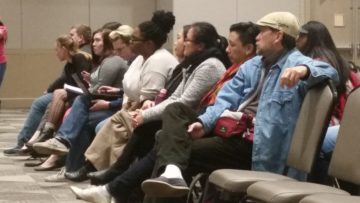
Students and faculty listen
Faculty need to be trained to use updated language when referring to people of diversity, and students need to be trained to offer safe spaces to each other.
To show support, all interested were encouraged to wear a safety pin as a symbol to others. Though the gesture is somewhat controversial, it works as a simple statement, said Kandann Coleman, of the Latino Student Union.
“To state that you stand in solidarity for people who feel targeted,” Coleman said. “The pin itself is an act of kindness, that you stand with the person sitting next to you.”
Those present were encouraged to go beyond facing the election as gay people, as black people, or as Latinos. All those marginalized in this election need to march together, Chapman said.
“We’re not strong that way,” working in isolation, she said. “We’ve all been attacked together. We all need to stand up together.”
Another speaker agreed. “People want us to separate. United we stand, divided we fall. And we’re falling right now.”
Silence will not work, one person said. Those angered by the election should speak out.
“There are people in the city who support love and peace. We need to be those people now.”
“We cannot be complacent,” said Bea Fields, a social work major. “This is not a normal election.”
“If we stay quiet, nothing will change,” said Naje Crawford.
The town hall was organized by Amanda Dortch, president of Undergraduate Student Government at BGSU. She assured those present that the university will do better – that the statements made at the gathering will matter.
“We will change things,” Dortch said.
One instructor talked of all the changes that have resulted because college students would not accept injustice. Campus movements are powerful, he said.
“At the end of the day, rest if you must. But don’t give up,” he said. “The college student is one of the most powerful people.”

